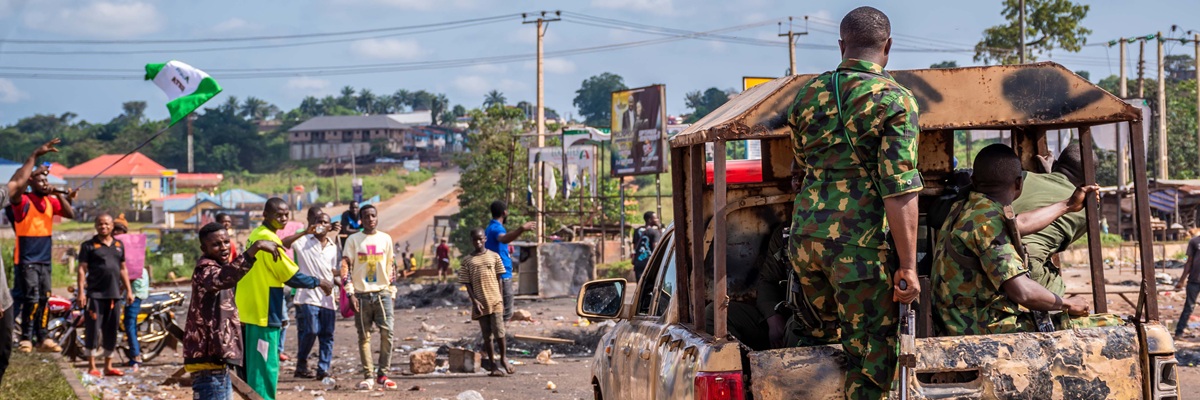Defense & Security
2025 for Africa (Part I: Security challenges)

Image Source : Shutterstock
Subscribe to our weekly newsletters for free
If you want to subscribe to World & New World Newsletter, please enter
your e-mail
Defense & Security

Image Source : Shutterstock
First Published in: Jan.10,2025
Feb.17, 2025
Conflict hotspots and democratic instability are the major challenges facing a continent that now everyone in the world wants to partner with.
In these, which will be the first articles of the year, we aim to reflect on 2025, a key year to consolidate Africa's growing importance in global geopolitics, a trend that has been evident in the last two years.
A key point: we are just days away from the inauguration of an unleashed Donald Trump* in international relations. It will be crucial to observe how he handles his ties with Africa and how African countries react in a world marked by populism, far-right politics, and the decline of multilateral organizations. This weakens global consensus and reduces the prominence of Human Rights in increasingly polarized international debates, marked by disinformation and noise.
Today, I will address the main challenges and threats facing the continent, from a more security-oriented perspective, including the main active and potential conflicts. Next week, I will take a more positive approach, focusing on the opportunities, even in this uncertain global scenario.
Sudan: The worst humanitarian catastrophe in the least mediated war
Sudan is facing the worst humanitarian catastrophe today, with over 150,000 deaths, millions of displaced people and refugees since the civil war began in April 2023. The conflict between the Sudanese Armed Forces (SAF) and the Rapid Support Forces (RSF) has left 24 million people facing food insecurity and triggered a cholera outbreak, accounting for 10% of the global humanitarian needs despite representing less than 1% of the world's population.
In 2025, the outlook remains bleak. The supply of weapons and fuel by Russia, Iran, and the United Arab Emirates fuels the conflict, while the lack of political will between the SAF and RSF blocks any progress toward peace. Without a drastic change in international intervention, Sudan will remain trapped in a cycle of war, hunger, and global neglect.
The conflict in Sudan is so complex that it is impossible to clearly define who the aggressors and the victims are, unlike in Ukraine or Palestine. In a world of simplification and misinformation, these complexities are overlooked, which explains why Sudan receives so little attention.
Sahel
In 2025, Sahel faces growing political instability and jihadist violence. Coups in Mali, Niger, and Burkina Faso have led to the formation of the Sahel Alliance (AES), an anti-Western military bloc seeking to consolidate its authority. However, it must gain legitimacy both with citizens and international institutions while managing crises in governance, development, and security. In this context, the region's stability and regional influence will depend on its relationship with the Economic Community of West African States (ECOWAS) (it is expected that in the coming days or weeks, the definitive rupture and exit** of the three countries from this West African economic bloc will be official), the African Union (which is also undergoing elections and renewal of its leaders) and foreign powers.
Russia's growing presence, especially through the previously known Wagner Group (now Africa Corps), further complicates the dynamics in the Sahel. Moscow has filled the void left by France's withdrawal and the diminished influence of the EU, offering military support to the juntas in exchange for expanding its geopolitical influence (while also taking large amounts of gold to finance its invasion of Ukraine).
However, the activities of Russian soldiers have been linked to human rights abuses, which could exacerbate social tensions and the delegitimization of military governments. It is a complicated moment, with a context of reinforcing the anti-Western narrative in the region (Senegal and Ivory Coast have already joined the call for the French to withdraw their troops from the military bases they still maintain in those countries) while consolidating the military juntas' dependence on external actors, rather than strengthening their state capabilities.
The rise of jihadist organizations and the resulting violence remain the biggest security challenge for the region. Factors such as poverty, corruption, and state weakness perpetuate the influence of these groups, which have shown a remarkable ability to adapt and fund themselves through the exploitation of local resources and illicit activities. The withdrawal of international forces has left a security vacuum that not only facilitates the expansion of their territorial and social control but also increases their recruitment capacity, as they become the only option for some young people to find a way to support themselves.
We thus have a prolonged Sahel crisis ahead, with all the implications it holds for the migration scenario along the so-called Atlantic Route, now primarily driven by young Malians fleeing the instability caused by jihadism and government breakdown. At the same time, we must remain attentive to maritime security in the Gulf of Guinea, whose control should be a concern for us.
Other conflicts
We must not forget that there are other points on the African continent that we must remain constantly alert to. Here, telegraphically, we highlight the main ones:
Somalia
The humanitarian crisis in Somalia remains one of the most complex in the world, exacerbated by internal conflicts, clan violence, and recurring climate disasters. In 2024, more than 4.5 million people in 20 districts were affected by insecurity and clashes, including over seventy clashes between clans since June, which caused the displacement of nearly 395,000 people. Additionally, military operations against the jihadist group Al-Shabaab and protection incidents related to displacement, which exceeded 11,000 between January and October 2024, are worsening the situation. Climate change has increased the country's vulnerability, with devastating events such as the 2020-2023 drought and the 2023 Deyr floods, which caused damages estimated at $176.1 million in 16 districts. The combination of conflicts and climate crises continues to undermine the country's recovery and development efforts.
Democratic Republic of the Congo
The DRC faces a critical stage in 2025, marked by the intensification of armed conflicts and severe food insecurity. Tensions in North Kivu, due to the advance of the M23/AFC group, and the increased military presence in provinces such as Maniema and Mai-Ndombe, threaten to cause massive displacement of people. Additionally, the concerning projections from United Nations agencies (FAO and WFP) on acute food insecurity foresee a significant deterioration for the most vulnerable populations in the country.
Ethiopia
Following the war between the central Ethiopian government and the northern Tigray region, Ethiopia has not yet closed the chapter on active conflicts, as it remains embroiled in a violent internal conflict, this time led by militia groups from the Amhara and Oromia regions. There are also concerns about the return of political hostility between Ethiopia and Eritrea.
—-
*Article was written before Trump’s inauguration, which was on January 20, 2025
**Mali, Niger and Burkina Faso formally exited ECOWAS on January 29, 2025.
First published in :

José Segura Clavell was born on 4 July 1944 in Barcelona. Married with 3 children, he is a Doctor in Chemical Sciences, Professor of Thermodynamics at the Official Nautical School of Tenerife and Professor of Applied Physics at the University of La Laguna.
A member of the Socialist Party, he was a councillor of the Cabildo of Tenerife from 1979 to 1991, and president from 1983 to 1987. In 1989 he was elected senator for the island of Tenerife, a post he held simultaneously for two years (1991-1993) with that of mayor of San Cristóbal de La Laguna. Between 1993 and 1996, he again served as senator. In 1996, he was elected deputy for the province of Santa Cruz de Tenerife until 2004, when he resigned from Congress to take up the post of Government Delegate in the Canary Islands (2004-2008).
He has been awarded the Gold Medal of the island of Tenerife, the Silver Cross of Merit of the Civil Guard and the Grand Cross of the Order of Military Merit. Author of books on Thermodynamics, irregular immigration, Special Register of Ships, air transport, climate change, electricity reform, strategic plan for the Canary Islands, among others, and 4 volumes with his articles on Africa written since he was appointed Director General of Casa África on 18 March 2019.
Unlock articles by signing up or logging in.
Become a member for unrestricted reading!